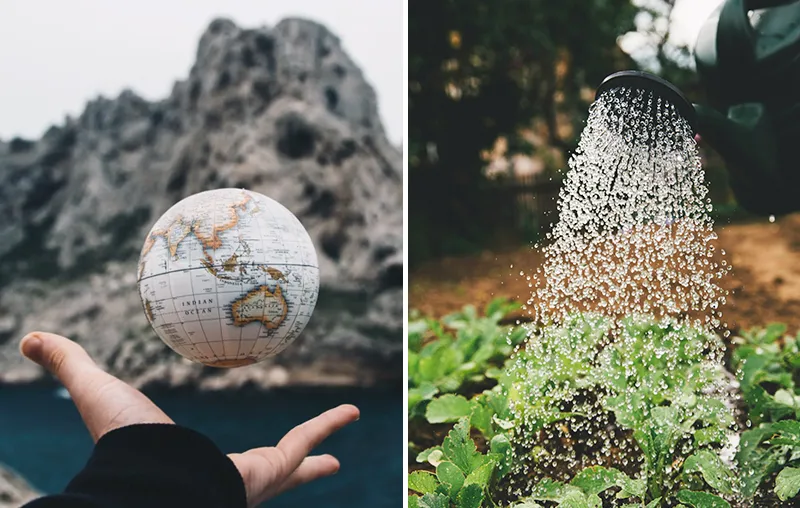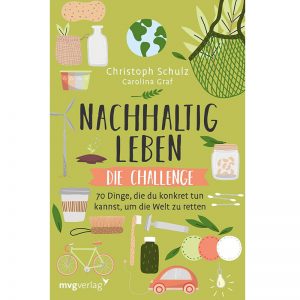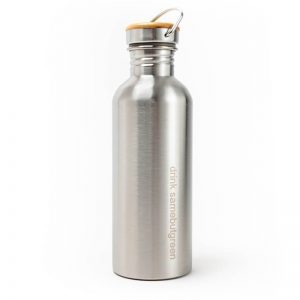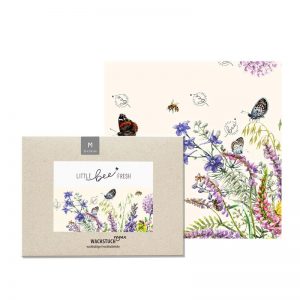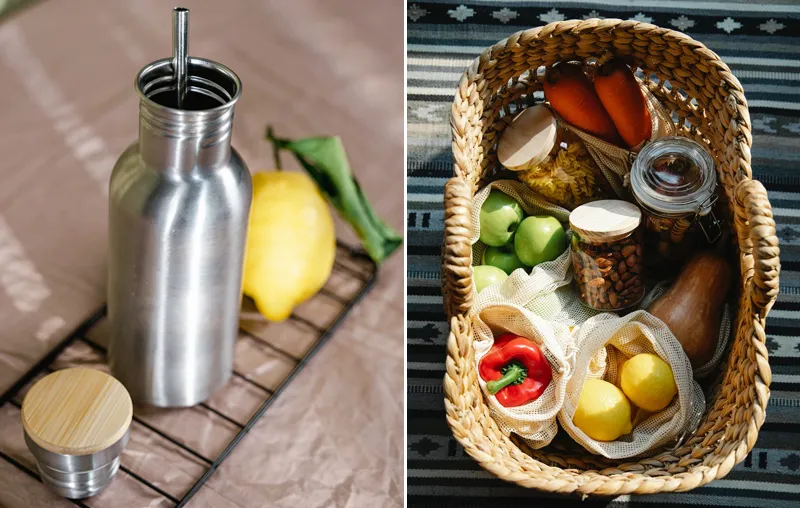How can we conserve natural resources in everyday life? If you're looking for a clear answer to this question, you've come to the right place! We humans are also facing massive ecological challenges because many Natural resources of the planet, such as oil, coal, natural gas, iron ore and sand, are not available in infinite quantities.
Nevertheless, we consume more resources than our planet can cope with. The annual Earth overload day is drawing ever closer to the beginning of the year. We are robbing the earth, destroying the livelihoods of other living beings and ultimately threatening our own existence. Fortunately, there are simple ways to do something about it!
In this article, I would like to give you some tips on how to consciously conserve resources every day without restricting yourself personally. Let's go!
Motives: Why should we conserve natural resources in everyday life?

We humans are part of nature. We influence it through our actions, but we are also dependent on it. By using our Destroying the environment, So we are literally sawing away at the branch we are sitting on. Rather than continuing to be part of the problem, we should devote ourselves to solving it as quickly as possible.
Here I would like to give you a brief the most motivating advantages of a resource-friendly lifestyle that you can use as constant drivers:
- Preserving the earth's limited resources for future generations: Those who protect nature also protect it for their own children and grandchildren. By conserving resources in everyday life, you ensure long-term recovery and the availability of limited raw materials - which ultimately keeps the cost of energy and materials affordable in the long term.
- Protect the environment and health: Resource-conscious action reduces your own carbon footprint, ecological footprintslows down the climate change and reduces waste in nature. It also protects vital resources such as clean drinking water, fertile soil and clean air.
- Protecting ecosystems: Conserving resources reduces the exploitation of the planet. Accordingly, you also make a valuable contribution to protecting the environment. stop global species extinction, the Biodiversity and to protect animals.
- Driving forward sustainable development: By conserving resources in everyday life, you promote the Environmental awareness and the sustainable lifestyle of our society. This makes you a role model with a tangible, positive impact.
- Preventing social conflicts and wars: The battle for natural resources such as drinking water, land and raw materials is coming to a head with increasing scarcity. Resource-conscious action therefore also reduces the risk of war, for example. It also counteracts social challenges such as the World hunger, against.
Can you think of any other advantages and reasons? Then write a comment under this article.
10 tips: How can you live more resource-friendly?
It's hard to imagine a scenario in which water suddenly stops coming out of the tap. But the Drinking water shortage already determines the everyday lives of countless people. Whether water, electricity, wood or gas - We should all be aware that most resources are not available in unlimited quantities and that we need to treat them with care and respect.
As promised, I will now introduce you to Valuable tips on protecting natural resources before. Simply integrate them into your everyday life bit by bit.
1. reduce consumption of animal foods

Our greed for meat causes animal suffering in the Factory farming - but also Water shortage and the Deforestation of the rainforests for the creation of arable land for Feed cultivation and Pastures are among the consequences.
To produce one animal calorie, an average of seven plant calories must be consumed.1 For one kilogram of beef more than 15,000 liters of water and 49 square meters of surface area are required - and around 27 kilograms of CO2 equivalents are emitted.2
Who the "Detour animal" avoids and eats a purely plant-based diet, you can conserve vast amounts of natural resources every day. For an easy changeover, I can warmly recommend the Online course "Going vegan made easy "* and my book "Cooking for the climate "* to the heart.
Further articles in the blog:
2. save energy
Whether we are charging our smartphone, surfing the internet or driving to work - we We all consume energy every day. But as long as this does not come from infinite, renewable resources, we are a huge burden on our planet. It is therefore advisable to switch to green electricity. If you like, you can Here directly to the green electricity comparison* - the change also only takes 5 minutes.
Regardless of the energy source, it is also always worth making conscious use of the available energy. For example, you can save it by using warm Cooling meals outside the refrigerator before you put them in. More Energy saving tips are, for example, the use of Motion detectors and the regular Defrosting the refrigerator.
3. save water
We consume water as a resource in our everyday lives both directly and indirectly. In direct form, when we Drink from the tap or watering the garden. And indirectly, by consuming food that is laboriously irrigated with scarce resources in dry countries.
In everyday life, for example, you can Save waterby Collect rainwaterto water your plants with. Or by preferring to drink tap water and consciously choosing your food. regional and seasonal shop. All of this has a positive effect on your personal Water footprint off.
Tip: Have a look at my Drinking bottle comparison an. My personal recommendation for simply avoiding mineral water packaged in plastic bottles is this glass bottle with swing top from Soulbottles*.
4. appreciate clothing
The Fast Fashion Industry has ensured that new trends and seasons are announced almost every week these days. But every item of clothing has a story. Cotton has to be grown quickly. This is only possible with the use of poisons - which costs many farmers their lives.
Clothing also needs to be sewn - and if a T-shirt only costs 5 euros, then someone inevitably had to pay for it. Nature, whose waters are already wearing the trend color of the new season. But also other people who had to sew it together for low wages in dark, dusty halls. This is impressively confirmed by the documentary "The True Cost - The Price of Fashion "*which is guaranteed to open your eyes.
So learn to use your Appreciate existing clothing and prefer second-hand fashion if possible. Also try to buy more items of clothing that are sustainable and can be easily combined with each other. This will ultimately save natural resources, create more space in your closet, save a lot of money and still have a wide selection.
Further articles in the blog:
- Slow fashion - what does it mean?
- Is it still appropriate to wear fur?
- Making clothing more durable
- How to recognize sustainable fashion!
5. save paper
Paper does not grow on trees - but it is made from them. For every sheet or paper product, a tree had to fall somewhere in the world. Be aware of this and avoid paper wherever possible. So you can definitely conserve this natural resource in your everyday life.
Of course, this also works well through the use of digital products. With a such e-reader* you can Reading books digitally, for example and save paper. And with Online maps on your smartphone, you don't need a thick paper city guide.
Further articles in the blog:
- Save paper in the office
- Deforestation of the forests
- Folding garbage bags from newspaper
- Paper or plastic - which is more environmentally friendly?
6. avoid food waste
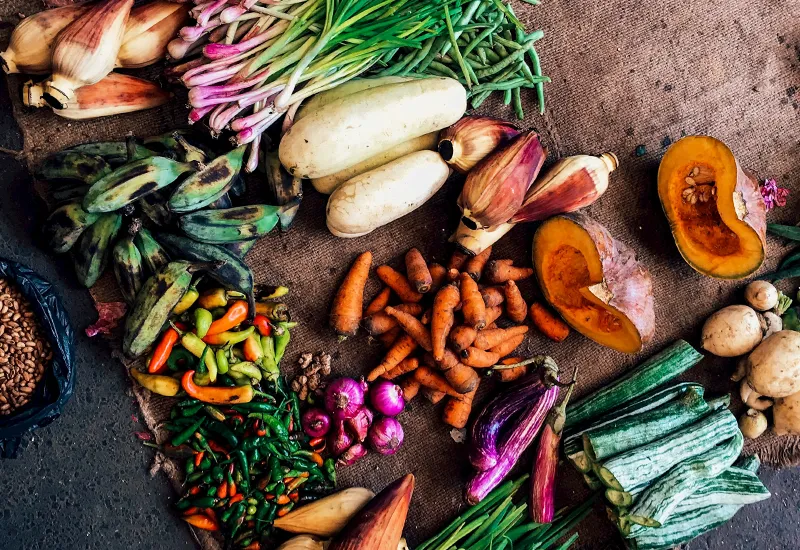
Around 78 kilograms of food that is still edible is the average amount of waste we Germans throw in the garbage can each year.3 Many animals had to suffer (completely in vain) for this - and many plants had to be irrigated at great expense. This is not respectful treatment - neither of sentient beings nor of the natural resources used.
Therefore, buy your food carefully and Reduce your food waste. Plan your meals the next week, preferably before you go shopping and Stick to your shopping listto avoid buying unnecessary items. These tips will make it much easier for you to conserve resources in your everyday life.
Further articles in the blog:
- Preserving food for longer
- Freeze food without plastic
- Food sharing - what is it?
- Making good use of leftover food
7. think minimalist
To prevent you from falling into old habits and wasting more resources over time, it is beneficial to have a personal attitude that guides your actions. focused on the really necessary things.
Consume and buy only those things that also have a represent real added value for you. That sounds logical, I know. But we often let ourselves be swayed by flashing advertising banners or pushy salespeople. If you consciously think minimalistically, your mindset can help you sustainably save a lot of money.
The book "The Minimalism Project" by Christof Hermann* by the way, has helped me personally enormously and is my absolute recommendation to you.
Further articles in the blog:
- Minimalist living - it's that simple!
- The best minimalism apps
- Psychology of minimalism
- Inspirational minimalism quotes
8. conscious use of technology
Around 68 million people in Germany have a smartphone4 - and many of them even own several! Especially because sconstantly new models and many of us want to hold it in our hands on the day of release.
Unfortunately, this Consumerism respect for the people who have to do the necessary rare metals (e.g. gold, cobalt and coltan in the Congo) from the mines. But there is also a lack of respect for nature, which provides us with these limited resources.
To conserve resources in your everyday life in this respect, you should So it's better to have your cell phone repaired and use them for as long as possible instead of constantly buying a new one. The preference for devices that refurbished (i.e. generally overhauled and tested, so to speak) is a resource-saving measure.
Further articles in the blog:
- Making sustainable calls - here's how!
- What are the disadvantages of smartphones?
- Buying a used smartphone - what you should look out for!
9. be sustainable on the road
About45 million diesel and gasoline enginesare already making use of German roads.5 On average, the cars emit226 grams of greenhouse gasesper kilometer driven.6
My observation is that we don't move around enough ourselves - and even jump into the driver's seat for short trips to the bakery. One More conscious use of the car (and of course the airplane!) and an economical use of the natural resources it consumes is definitely appropriate. Both in order to protect the environment in everyday lifeas well as to stay healthy.
Walk more insteadI cycle and use public transport and the train to get around the city. Avoid driving and flying as much as possible.
Further articles in the blog:
- Living car-free - how it works
- Sustainable driving - the best tips
- Offsetting CO2
- Flying sustainably - how it works
10. avoid waste
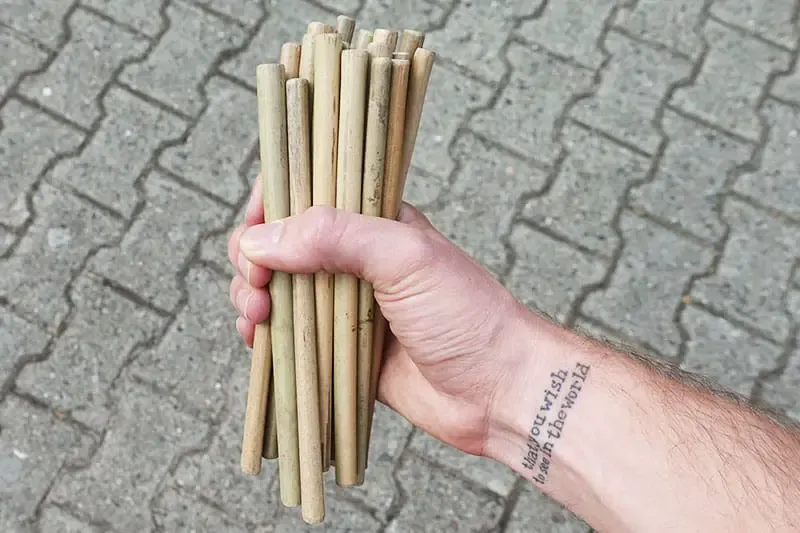
Many products and especially Many product packages are superfluous. For this reason, the Zero Waste Lifestyle have emerged. People are specifically trying to avoid waste.
With this in mind, you can Replace countless disposable products with reusable alternatives. Swap plastic straws for washable ones, for example Glass straws*, Bamboo* or Stainless steel* - and the plastic and paper bags for fruit and vegetables in the supermarket against Reusable vegetable nets* made of cotton.
Further articles in the blog:
Conserving natural resources in everyday life - it's easy!
Waste and robbery are disrespectful - towards nature, towards animals and towards other people. It is incredibly important to protect all Appreciate the resources that this planet provides and to treat them in such a way that they will also be available to future generations.
I very much hope that this article will be of great help to you. Simply integrate the tips into your everyday life bit by bitto make a real difference.
"We deal with this world as if we had a second one in the trunk."
Jane Fonda (more at Environmental protection quotes)
Do you have any questions, tips or your own experiences with resource-conserving living that you would like to share? Then simply write me a comment.
Stay environmentally friendly,

PS: In my Environmental protection blog you can find out much more about a sustainable everyday life. Next, for example, find out how you can create a create a bird friendly garden and enjoy the birdsong every day.
References:
- S. Weick; Brot für die Welt; Evangelisches Werk für Diakonie und Entwicklung e.V. (2010): Meat consumption (as of March 2010). https://www.brot-fuer-die-welt.de/fileadmin/mediapool/2_Downloads/NIFSA/NIFSA_Kampagnenblatt_Fleischkonsum.pdf. [27.02.2024]. ↩︎
- Bund für Umwelt und Naturschutz Deutschland e. V.: Protecting resources and using them respectfully! (as of February 2014), available at https://t1p.de/7bsy. [27.02.2024]. ↩︎
- Federal Environment Agency: Food waste (as at: 31.05.2023), available at https://www.umweltbundesamt.de/themen/abfall-ressourcen/abfallwirtschaft/abfallvermeidung/lebensmittelabfaelle. [27.02.2024]. ↩︎
- Statista; VuMA; Bitkom Research; comScore: Number of smartphone users in Germany in the years 2009 to 2022 and forecast to 2027 (as of July 2023), available at https://de.statista.com/statistik/daten/studie/198959/umfrage/anzahl-der-smartphonenutzer-in-deutschland-seit-2010. [27.02.2024]. ↩︎
- Kraftfahrt-Bundesamt (KBA): Number of passenger cars in Germany by fuel type from 2017 to 2023 (as of March 2023), available at https://de.statista.com/statistik/daten/studie/4270/umfrage/pkw-bestand-in-deutschland-nach-kraftstoffarten. [27.02.2024]. ↩︎
- Federal Environment Agency: Safer and more environmentally friendly travel by bus and train (as of 19.07.2023), available at https://www.umweltbundesamt.de/umwelttipps-fuer-den-alltag/mobilitaet/bus-bahn-fahren. [27.02.2024]. ↩︎

